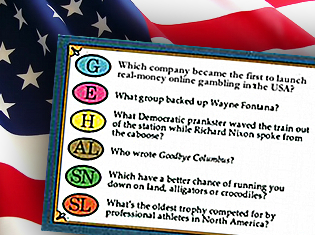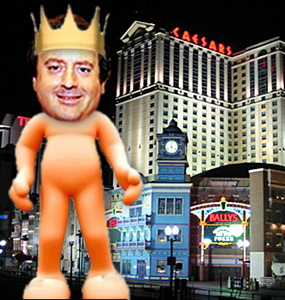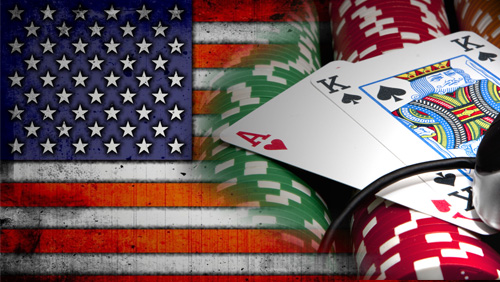 Behold! The US gambling stories that made an impression in 2013, or at least, the ones we can remember, because someone in the office done slipped some serious mickeys into our eggnog.
Behold! The US gambling stories that made an impression in 2013, or at least, the ones we can remember, because someone in the office done slipped some serious mickeys into our eggnog.
ONLINE GAMBLING POPS AMERICA’S OVERRIPE CHERRY
Trivia buffs got a new factoid to remember as Fertitta Interactive’s Ultimate Poker went into the history books in April as the first state-sanctioned non-horseracing site in the United States to take a real-money wager over the internet. Ultimate Poker had the state all to itself until September, when Caesars Entertainment launched its 888 Holdings-powered WSOP.com site. Nevada had a monopoly claim on US online gambling until November, when Delaware upped the ante by becoming the first state to launch a full range of online gambling options, although its system was the monopoly of the state lottery and the state itself contains only slightly more people than Torontonians who have smoked crack with Rob Ford.
A few weeks later, New Jersey defied expectations by launching its own online gambling regime on time and (so far) without major hiccups, despite having accomplished this task on a far more aggressive timeline than Nevada took to launch its poker-only system. New Jersey also boasted the participation of many more gambling companies than Nevada, creating the first genuine test for how a competitive intrastate online gambling market will pan out in the US of A.
POKERSTARS’ GARDEN (STATE) OF STONE
In January, word leaked that PokerStars had officially filed a gaming license application with New Jersey regulators, a necessary followup to the December 2012 news that Stars had reached a deal to buy the Atlantic Club Casino Hotel. A bright future beckoned as PokerStars vowed to build a mammoth online data center in Atlantic City and a swanky new live poker room at the Atlantic Club. And when Gov. Chris Christie signed the state’s online gambling legislation in the spring, Stars looked like bloody geniuses.
And then they didn’t. In March, Caesars Entertainment – wearing an expertly tailored American Gaming Association (AGA) costume – launched a public relations broadside against Stars’ New Jersey ambitions. Shortly thereafter, word spread that the Atlantic Club was trying to back out of its deal while keeping the $11m Stars had advanced it, a move subsequently legitimized by the courts. Undaunted, Stars inked a new online partnership with Resorts Casino Hotel, but in December, New Jersey officially let Stars know that their license application wouldn’t see a green light until they resolved their lingering Scheinberg problem.
 SHELDON ADELSON OPENS A CAN O’WHUP-ASS
SHELDON ADELSON OPENS A CAN O’WHUP-ASS
Las Vegas Sands honcho Sheldon Adelson’s antipathy toward online gambling was hardly a secret prior to 2013, but this was the year his disdain morphed into full-throated contempt. Adelson went from making offhand comments at public gatherings to going full on Jeremiah; writing op-eds, launching websites, hiring lobbyists, appearing on TV shows and vowing to spend “whatever it takes” to cram the online genie back in the bottle, both at home and abroad. Much like Cher, Shel sought to turn back time to the good old days when gamblers needed to get all dolled up and actually leave their homes to gamble, after which they’d drive home broke, embittered and drunk off their ass.
BRICK AND MORTAR CASINOS OFFICIALLY TOP OUT
Atlantic City casinos are on track to record their seventh straight year of annual revenue declines, largely due to increased regional competition, but 2013 was the first year that casinos in neighboring Pennsylvania began reporting their own annual revenue declines. And this is before a horde of new mega-casinos opens in New York and Massachusetts. Much to Adelson’s chagrin, some of these states are considering online gambling as a way of restoring their gambling mojo.
The AGA’s most recent State of the States report shows casino revenue increasing slightly from 2011 to 2012, but the states with the biggest gains all featured new casinos drawing in looky-loos, an unsustainable novelty factor that creates great gulfs between the shiny new haves and the dingy old have-nots. Even mighty Nevada is showing signs of weakness, having grown virtually dependent on the extreme variance of VIP baccarat: if visiting Asian whales have a good month, Nevada has a bad one, and vice versa.
SPORTS BETTING SLAPPED DOWN ON BOTH SIDES OF THE 49TH PARALLEL
Nevada got some good news in February, when a federal court preserved the state’s single-game sports betting monopoly by slapping an injunction on New Jersey’s bid to be treated as Nevada’s equal. In November, a federal appeals court upheld this injunction, and while the state is seeking a Supreme Court appeal, the odds of the Court agreeing to hear the case aren’t great. Typically, Canada took a less dramatic path to disappointing sports betting fans, allowing the unelected members of the country’s upper legislative chamber to stretch out debate on the C-290 sports betting bill until Canadians forgot it existed.
Meanwhile, US authorities continued to crack the whip on sports betting operations it considers to be operating out of bounds – despite legendary bettor Billy Walters holding such companies in high regard – by taking down the Legends Sports site, the Taiwanchik-Trincher bunch, a number of smaller online credit betting operations and even extraditing BetUS man Larry Hartman from Nicaragua. The Taiwanchik-Trincher bust alone has so far resulted in asset forfeitures totaling $68m, so you can expect both the indictments and the cha-chings to continue. Canada did its best to keep up on the clampdown front, taking down a motorcycle gang’s online credit betting operation on Super Bowl Sunday, but the site was back online within days.
ZYNGA’S BUBBLE POPS
After an eternity of teasing investors with visions of the real-money gambling train pulling into the station with boxcars full of cash, struggling social game outfit Zynga finally launched its first online gambling offering in the spring (mere days after April Fool’s, in case anyone missed the subtext). Frankly, the jig should have been up when the UK-facing ZyngaPlus sites turned out to be little more than warmed over Bwin.party products with Zynga logos hurriedly stenciled overtop.
The next few months saw players turning away in droves, a Stalin-worthy purge of one-fifth of its workforce, studio closures, a new CEO and the loss of the Facebook social games crown to rivals King. Zynga finally came clean with July’s Q2 earnings report – its first with a real adult as CEO – admitting that it couldn’t sustain the real-money charade any longer. Ironically, the company’s share price has risen by a third ever since it stopped lying its creatively bankrupt ass off.
 CAESARS’ ANNIS HORRIBLIS
CAESARS’ ANNIS HORRIBLIS
Caesars Entertainment can look back at 2013 and note a few accomplishments, not the least of which is keeping PokerStars out of New Jersey (for the time being, at least). Like Zynga, Caesars has touted online gambling as the white knight that will vanquish the evil creditors currently laying siege to Gary Loveman’s (pictured at right) crumbling castle, meaning its 2013 launch in both New Jersey and Nevada should be cause for celebration. However, now that the hype is over, those online revenue figures better be significant, or else this emperor will be truly exposed as wearing no clothes.
Caesars also spun off its online operations into a separate public entity/escape pod to protect them from the parent company’s $24b debt load, but that means the parent firm won’t enjoy the full benefits of the new online revenue stream. Caesars also managed to kick its debt can a little further down the road, but Caesars’ losses through the first three quarters of 2013 amounted to just under $1.2b – on pace to match or beat last year’s $1.5b loss – and most observers are wondering how long the charade of sustainability can continue.
The need for quick cash infusions finally convinced Caesars to sell off its Macau golf course (at a significant loss) and the company’s Asian ambitions took another kick in the dumplings when South Korea rejected Caesars’ casino bid over concerns that the company wouldn’t survive long enough to complete the project. Needless to say, this type of public smackdown won’t help Caesars in the fierce competition for a Japanese casino. Caesars took a similar black eye on the domestic front after Massachusetts tarnished them with the ‘unsuitable’ brush, although this declaration is now the subject of litigation.
LOCK POKER
Lock Poker enjoyed a couple years of easy pickings in the post-Black Friday US online poker landscape, but Jennifer Larson’s crazy train truly went off the rails in 2013. Already struggling to fend off mounting slow-pay/no-pay accusations from both players and other skins on the Revolution network, Lock simply stopped allowing withdrawals in April, a genius move that had Lock’s braintrust wondering why they hadn’t adopted this money-saving tactic earlier.
The ensuring brouhaha convinced Lock to close its dedicated forum on TwoPlusTwo, opting to open their own forum in which discouraging words are seldom heard. Lock then left Revolution for its own standalone site, starting a ‘he lied/she lied’ PR war with Revolution over whether Lock jumped or was pushed, as well as accusations that Lock had used player funds to purchase its new software platform. Regardless, the new site proved no more willing/able to pay players, leading payment processor Skrill to stop allowing deposits to Lock, a restriction Lock hilariously attempted to claim it had requested. Barring a miracle, that diamond in Lock’s logo should return to its original state as a lump of coal sometime early in 2014.
